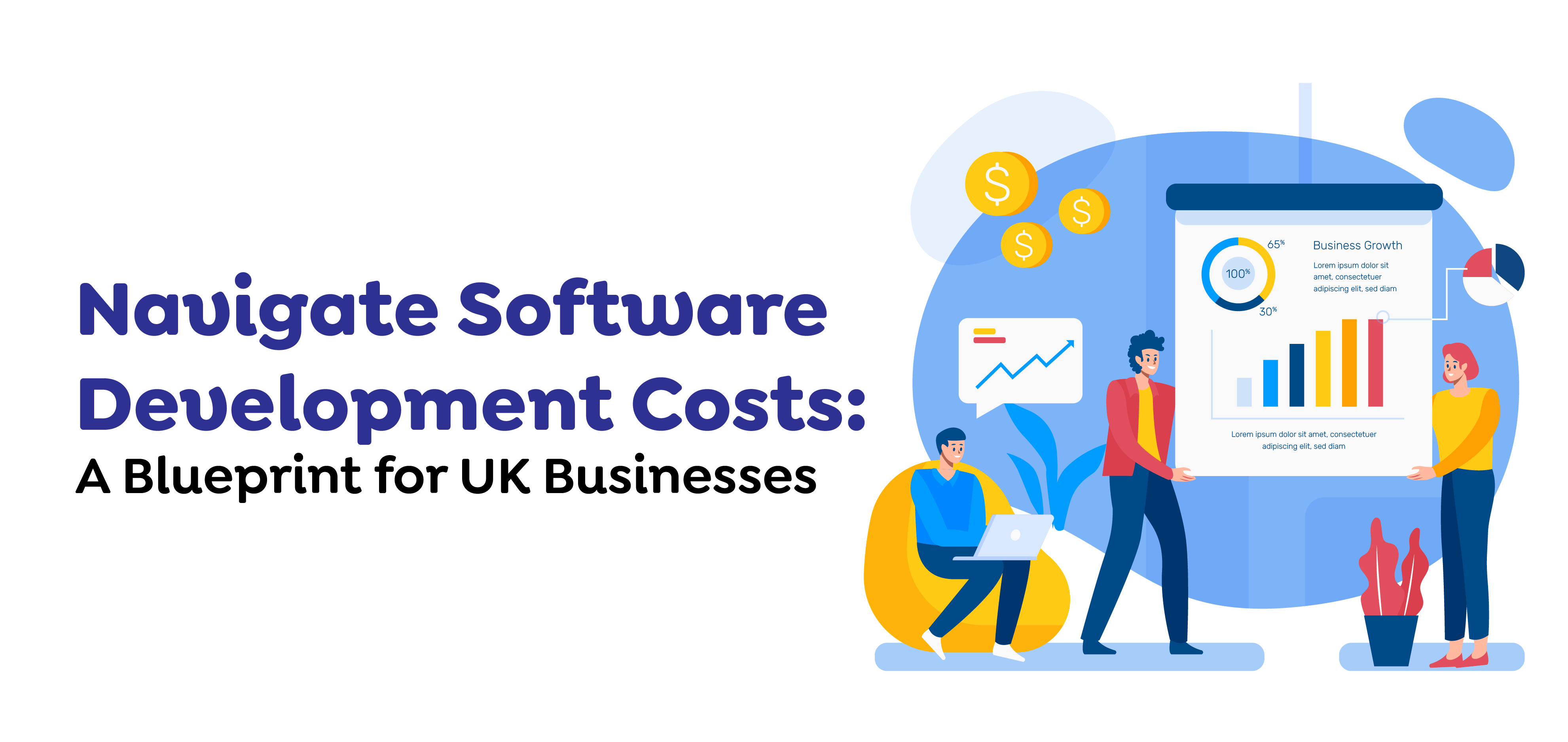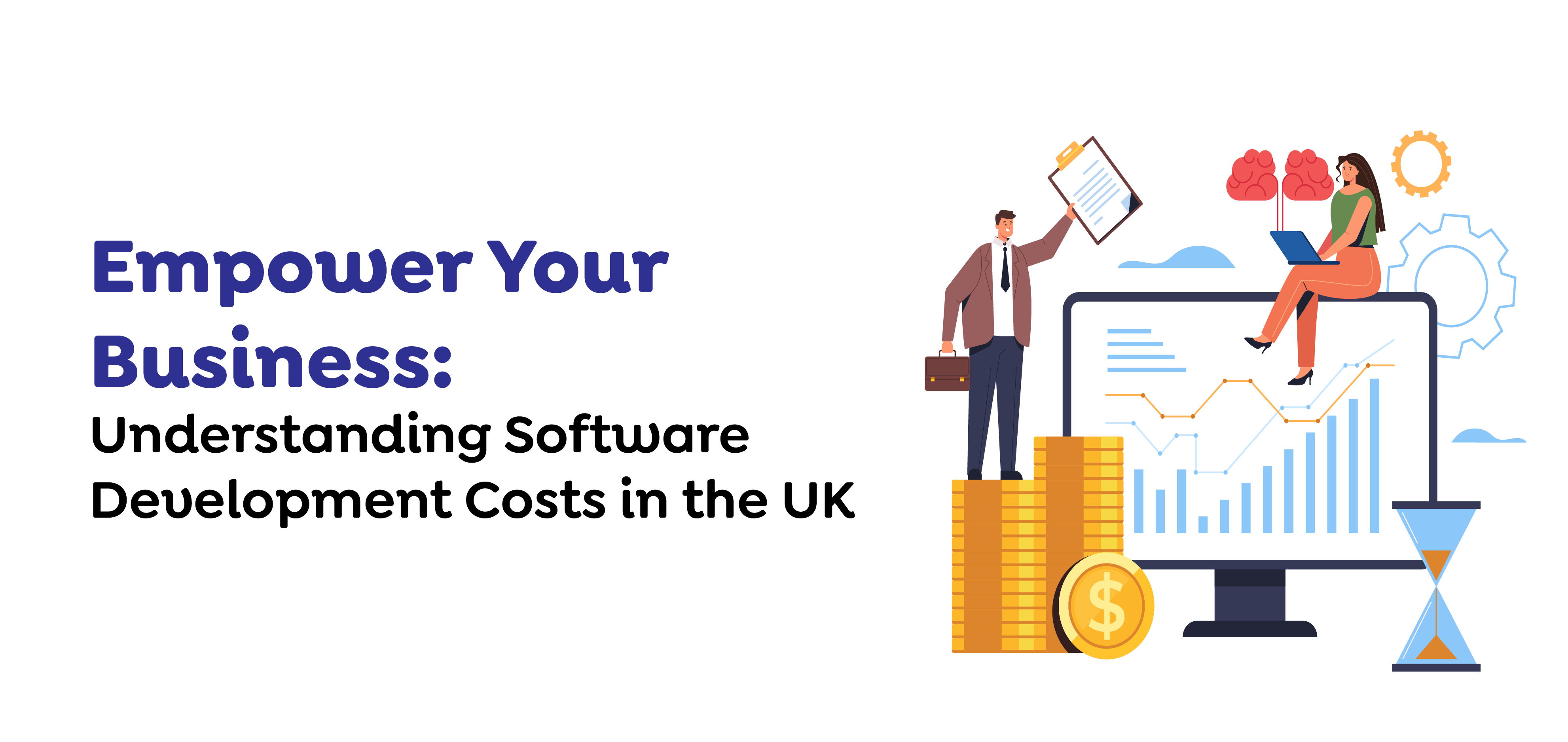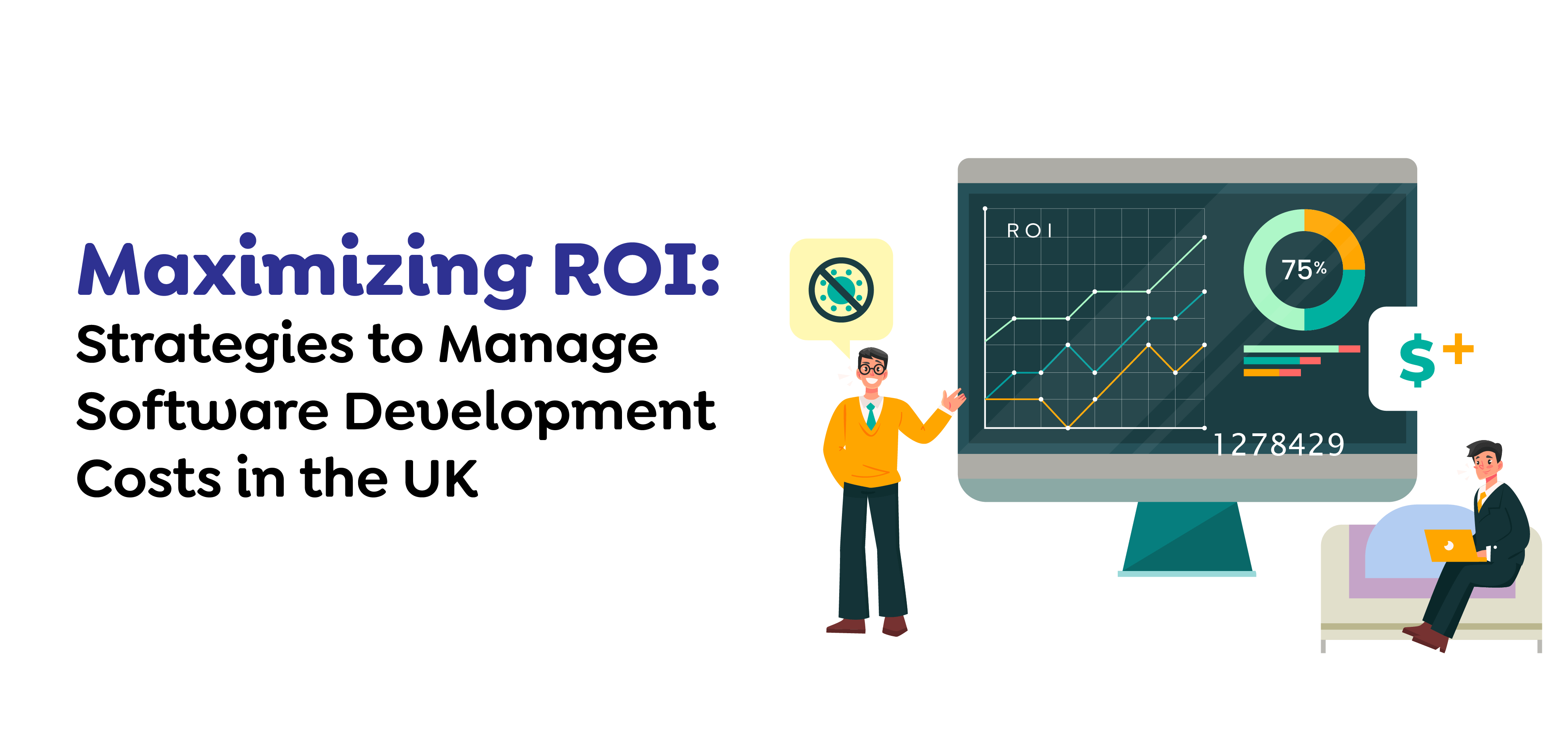Write Us
We are just a call away
[ LET’S TALK AI ]
X
Discover AI-
Powered Solutions
Get ready to explore cutting-edge AI technologies that can transform your workflow!


In the swiftly evolving digital environment of today, where enterprises are consistently pursuing innovative resolutions to maintain competitiveness, software development emerges as a fundamental pillar for triumph. From streamlining operations to enriching customer experiences, the advantages of well-executed software initiatives are indisputable. Nevertheless, navigating the domain of software development expenditures in the UK can be intimidating for enterprises of all magnitudes. Within this extensive manual, we delve into the complexities of app development cost in UK, investigating the variables impacting expenditures, methods for cost enhancement, and the significance of selecting the appropriate development collaborator.

Program creation acts as a stimulant for corporate metamorphosis, allowing establishments to adjust to progressing market requisites and technological enhancements. Through the automation of procedures, efficient data administration, and the furnishing of actionable discernments via analytics, software resolutions authorize enterprises to formulate enlightened judgments and propel expansion. Whether it’s a vibrant webpage, an extensive mobile app development company in UK, or a resilient corporate software collection, the influence of program creation spans numerous trades and fields.
The app development cost in UK is influenced by a variety of factors, each contributing to the overall project cost. These elements cover an extensive array of factors, comprising the intricacy of the preferred characteristics, the selection of a technology framework, the degree of personalization needed, the magnitude and proficiency of the development crew, the project’s duration and scope, and any supplementary expenditures like licensing charges, hardware expenses, and persistent upkeep and assistance. Grasping and meticulously assessing these elements is crucial for precise financial planning and efficient project supervision, guaranteeing that resources are distributed competently and that the ultimate outcome fulfills both operational necessities and financial restrictions.
Also Read – How To Find Out The Best App Development Framework For Your Business?

One pivotal choice confronting enterprises is the selection between bespoke software development in UK and pre-made solutions. Though pre-made software might initially appear economically advantageous, tailored software presents numerous benefits that validate the greater investment:
Customized software is crafted to cater to precise business requisites and workflows, providing unmatched personalization and scalability.
Tailor-made applications can be constructed with robust security protocols customized to shield sensitive data and counter potential hazards.
Tailored software solutions possess the capability to adjust to evolving business demands and expand effortlessly as operations grow, guaranteeing sustained viability and cost-effectiveness.
Tailoring software solutions to harmonize with brand ethos and customer inclinations fosters a distinctive brand persona and distinguishes enterprises from rivals.
While providing a specific cost to develop a mobile app may vary depending on individual project requirements and market dynamics, it’s essential to understand the app development cost ranges associated with different types of software development projects. These ranges serve as a reference point for businesses embarking on software initiatives, helping them gauge potential investment levels and allocate resources effectively.
Also Read – The Ultimate Guide to Energy Management Software Development: Mastering Energy Efficiency!
Tailored software evolution encompasses diverse phases, each contributing to the total project expenditure:
1. Initial Planning: The starting stage involves gathering prerequisites, conducting viability assessments, outlining project extent, and establishing the groundwork for ensuing development ventures.
2. UI/UX Crafting: Crafting the user engagement and user experience are crucial in molding the usability and visual allure of the software. Allocating resources to intuitive design heightens user involvement and gratification.
3. Creation and Programming: The fundamental development phase involves transforming design blueprints and specifications into operational software solutions. Proficient developers employ coding languages, frameworks, and utilities to construct resilient and scalable applications.
4. Examination and Quality Assurance (QA): Thorough examination and QA protocols ensure that the software aligns with quality benchmarks, performs as envisaged, and remains devoid of flaws or susceptibilities.
5. Implementation and Launch: The concluding phase entails implementing the software into production settings, configuring servers, and introducing the application to end-users.
Alongside these primary expenditure constituents, enterprises might confront supplementary costs such as licensing fees for third-party libraries or frameworks, hardware acquisition for specialized infrastructure requisites, and continual upkeep and assistance expenditures post-deployment.

Agile methodology has surfaced as a favored strategy for economical software creation, presenting numerous benefits compared to conventional waterfall techniques.
By adopting nimble principles and methodologies, enterprises can streamline development processes, alleviate risks, and optimize resource employment, ultimately leading to more economical and effective software distribution.
In the present-day contemporary digital period, the progression of mobile applications has sparked a notable metamorphosis in how enterprises function and connect with their clientele. A mobile app development company has emerged as a formidable instrument that not only hastens transactions but also cultivates stronger relationships, streamlines operations, and fosters expansion. Here are some fundamental aspects of the transformative influence of application development on enterprises:
Enterprises undergo transformation post-application development in numerous ways:
Applications afford patrons convenient access to commodities, amenities, and information at any time and place, thereby heightening engagement and sales prospects.
Meticulously crafted applications offer instinctive interfaces, tailored content, and seamless interactions, thereby amplifying overall customer contentment and allegiance.
Internal enterprise applications refine procedures, automate chores, and ease communication among personnel, culminating in enhanced efficiency and productivity.
Applications capture invaluable data regarding user behavior, preferences, and patterns, empowering enterprises to procure actionable insights for enlightened decision-making and targeted marketing approaches.
Applications empower enterprises to penetrate novel markets and demographics, fostering expansion and broadening their clienteles beyond geographical confines.
An existence on mobile platforms amplifies brand exposure and fosters brand acknowledgment, assisting corporations in setting themselves apart in fiercely competitive markets and building stronger brand value.
Businesses furnished with inventive and feature-laden applications secure a competitive edge, captivating and retaining clientele while staying ahead of market trends and rivals.
In summary, application development plays a crucial role in modernizing business operations, enhancing customer interaction, and fostering growth in the current digitally-driven environment.


How to choose a mobile app development company? Choosing the appropriate software development collaborator is crucial for project success and the effectiveness of app development cost in UK. Consider the following aspects when assessing potential collaborators:
1. Proficiency and Background: Seek a collaborator with a demonstrated history and extensive familiarity with your industry and technology stack. Their expertise guarantees the efficient development of your software solution.
2. Personalization and Adaptability: Ensure the collaborator can furnish customized solutions that match your distinct requirements and business aims, providing adaptability to accommodate evolving demands.
3. Communication and Partnership: Opt for a collaborator that prioritizes transparent communication and works closely with you throughout the development journey, promoting openness and synchronization.
4. Quality Control and Evaluation: Validate that the collaborator enforces stringent quality assurance protocols to guarantee software that meets elevated standards of performance, security, and functionality.
5. Growth and Persistent Maintenance: Choose a partner with the ability to deliver scalable solutions that can adjust to your business growth, offering continuous support and maintenance to guarantee the relevance and efficiency of your software.
6. Creativity and Technological Competence: Engage with a progressive organization that stays abreast of cutting-edge trends and technologies, allowing you to utilize innovative solutions for a competitive advantage.
7. Client Testimonials and Endorsements: Scrutinize feedback from past patrons and solicit recommendations to authenticate the collaborator’s abilities and history of accomplishments.
8. Openness and Pricing: Look for a designer that offers transparent pricing and project management methods, minimizing unexpected expenses and ensuring conformity with financial constraints.
9. Cultural Compatibility and Collaborative Perspective: Establishing a harmonious working relationship is pivotal for project success. Choose a collaborator whose organizational culture resonates with yours, fostering collaboration and confidence for enduring achievement.

Software development represents a strategic investment for businesses seeking to innovate, streamline operations, and enhance competitiveness in today’s digital economy. By understanding the intricacies of the app development cost in UK, leveraging agile methodologies, and selecting the right development partner, businesses can optimize returns on investment and achieve software solutions that precisely align with their needs and objectives. As technology continues to evolve and market dynamics shift, embracing a proactive approach to software development and cost management is essential for sustained growth and success.
Also Read – FinTech in Investment Banking: How It Can Help the Unbanked Population?
If you’re ready to embark on your next software development journey like Techugo, we’re here to help. Our team of seasoned professionals specializes in delivering tailored software solutions that drive business growth and innovation. Contact us today to schedule a free consultation and learn more about our comprehensive software development services. Let’s bring your vision to life and unlock the full potential of your business through cutting-edge software solutions.
Write Us
sales@techugo.comOr fill this form